大学英语语法全书
- 格式:ppt
- 大小:9.55 MB
- 文档页数:576
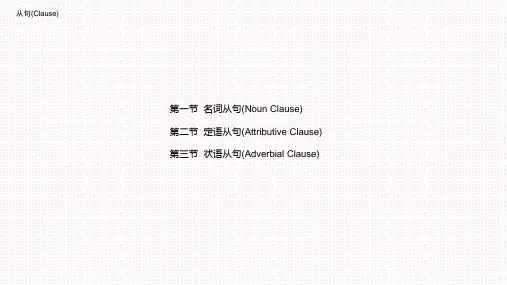
![大学英语语法(全)[1]](https://uimg.taocdn.com/aa9ddc3deefdc8d376ee32c5.webp)
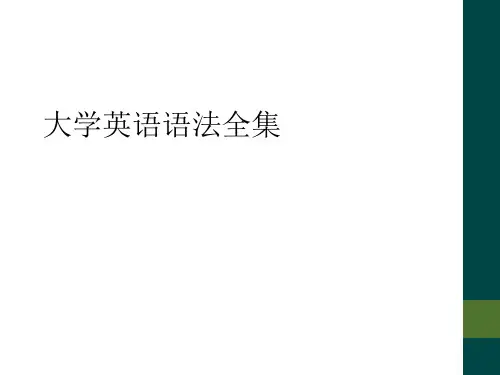
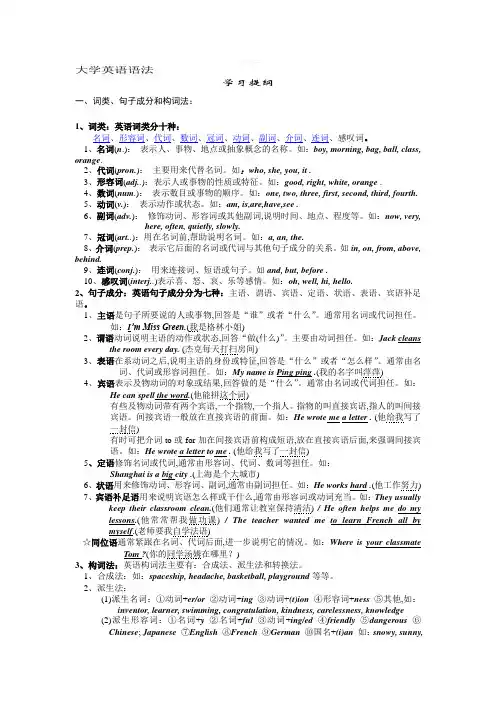
大学英语语法学习提纲一、词类、句子成分和构词法:1、词类:英语词类分十种:名词、形容词、代词、数词、冠词、动词、副词、介词、连词、感叹词。
1、名词(n.):表示人、事物、地点或抽象概念的名称。
如:boy, morning, bag, ball, class, orange.2、代词(pron.):主要用来代替名词。
如:who, she, you, it .3、形容词(adj..):表示人或事物的性质或特征。
如:good, right, white, orange .4、数词(num.):表示数目或事物的顺序。
如:one, two, three, first, second, third, fourth.5、动词(v.):表示动作或状态。
如:am, is,are,have,see .6、副词(adv.):修饰动词、形容词或其他副词,说明时间、地点、程度等。
如:now, very,here, often, quietly, slowly.7、冠词(art..):用在名词前,帮助说明名词。
如:a, an, the.8、介词(prep.):表示它后面的名词或代词与其他句子成分的关系。
如in, on, from, above, behind.9、连词(conj.):用来连接词、短语或句子。
如and, but, before .10、感叹词(interj..)表示喜、怒、哀、乐等感情。
如:oh, well, hi, hello.2、句子成分:英语句子成分分为七种:主语、谓语、宾语、定语、状语、表语、宾语补足语。
1、主语是句子所要说的人或事物,回答是“谁”或者“什么”。
通常用名词或代词担任。
如:I’m Miss Green.(我是格林小姐)2、谓语动词说明主语的动作或状态,回答“做(什么)”。
主要由动词担任。
如:Jack cleansthe room every day. (杰克每天打扫房间)3、表语在系动词之后,说明主语的身份或特征,回答是“什么”或者“怎么样”。
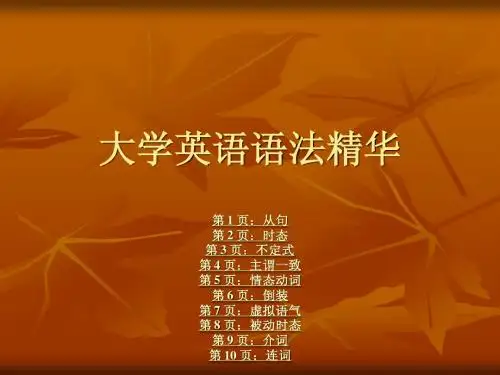
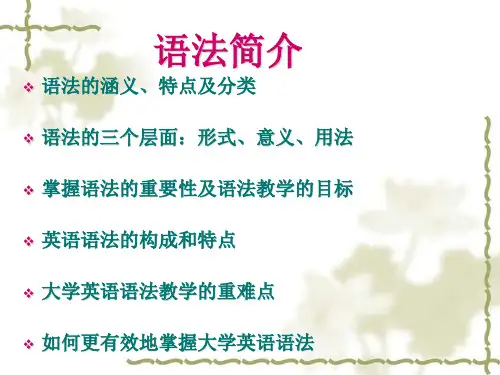
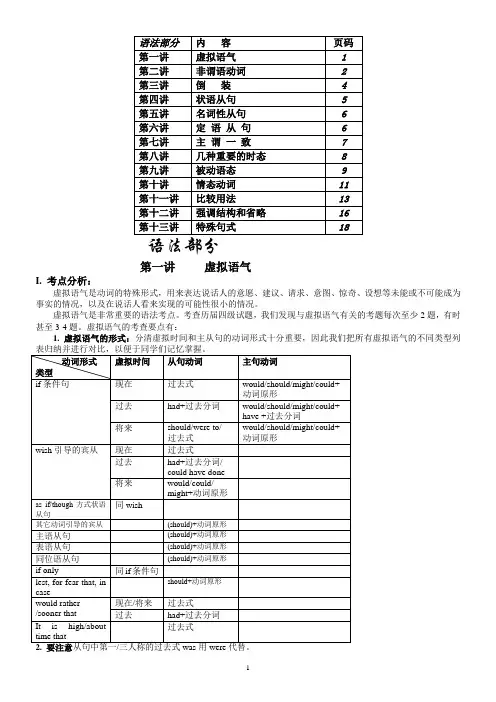
语法部分第一讲虚拟语气I. 考点分析:虚拟语气是动词的特殊形式,用来表达说话人的意愿、建议、请求、意图、惊奇、设想等未能或不可能成为事实的情况,以及在说话人看来实现的可能性很小的情况。
虚拟语气是非常重要的语法考点。
考查历届四级试题,我们发现与虚拟语气有关的考题每次至少2题,有时甚至3-4题。
虚拟语气的考查要点有:1. 虚拟语气的形式:分清虚拟时间和主从句的动词形式十分重要,因此我们把所有虚拟语气的不同类型列例如:If I were invited, I would come.If she were not ill, she could do a lot of things.3. if条件句中如谓语动词是were, had, should, could时,可以省略if, 把它们前置。
例如:Had my father a lot of money, he would send me abroad.Could I do it, I would surely do it.Should the Black Death reappear, what should we do?(万一黑死病再次出现,我们该怎么办?)4. 错综时间的条件句是难点,如99年1月第60题: If I hadn’t stood under the ladder to catch you when you fell, you wouldn’t be smiling now.(从句用过去完成时,主句用现在进行时)又如:If I were you, I would have gone to the film last night.(从句虚拟现在,主句虚拟过去);If we hadn’t got everything ready by now, we should be having a terrible time tomorrow.(从句虚拟过去,主句虚拟将来);If the weather had been more favorable, the crops would be growing still better.(从句虚拟过去,主句虚拟现在)5. 虚拟句的另一难点是省略if条件句的含蓄条件句,如:I would have written the paper before, but I have beenill.(=If I had not been ill, I would have written the paper before.);A true friend would have acted differently. (=A friend, if he had been true, would have acted differently.)6. 注意介词短语without, but for, in the absence等表示虚拟条件。
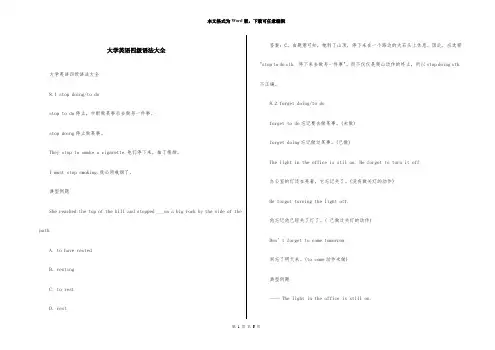
大学英语四级语法大全大学英语四级语法大全8.1 stop doing/to dostop to do停止,中断做某事后去做另一件事。
stop doing停止做某事。
They stop to smoke a cigarette.他们停下来,抽了根烟。
I must stop smoking.我必须戒烟了。
典型例题She reached the top of the hill and stopped ___on a big rock by the side of the path.A. to have restedB. restingC. to restD. rest答案:C。
由题意可知,她到了山顶,停下来在一个路边的大石头上休息。
因此,应选择"stop to do sth. 停下来去做另一件事"。
而不仅仅是爬山动作的终止,所以stop doing sth.不正确。
8.2 forget doing/to doforget to do忘记要去做某事。
(未做)forget doing忘记做过某事。
(已做)The light in the office is stil on. He forgot to turn it off.办公室的灯还在亮着,它忘记关了。
(没有做关灯的动作)He forgot turning the light off.他忘记他已经关了灯了。
( 已做过关灯的动作)Don’t forget to come tomorrow.别忘了明天来。
(to come动作未做)典型例题---- The light in the office is still on.---- Oh,I forgot___.A. turning it offB. turn it offC. to turn it offD. having turned it off答案:C。
由the light is still on 可知灯亮着,即关灯的动作没有发生,因此用forget to do sth.而forget doing sth表示灯已经关上了,而自己忘记了这一事实。
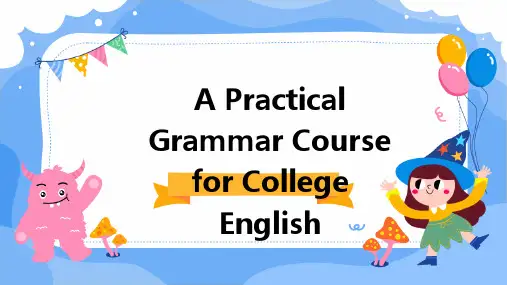
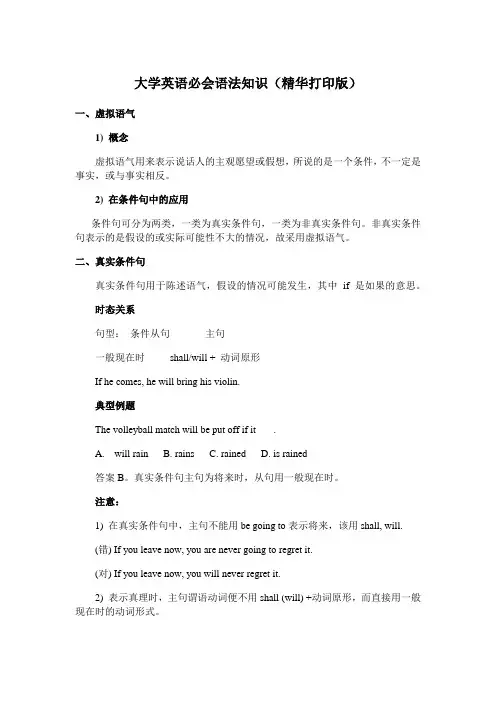
大学英语必会语法知识(精华打印版)一、虚拟语气1) 概念虚拟语气用来表示说话人的主观愿望或假想,所说的是一个条件,不一定是事实,或与事实相反。
2) 在条件句中的应用条件句可分为两类,一类为真实条件句,一类为非真实条件句。
非真实条件句表示的是假设的或实际可能性不大的情况,故采用虚拟语气。
二、真实条件句真实条件句用于陈述语气,假设的情况可能发生,其中if 是如果的意思。
时态关系句型:条件从句主句一般现在时shall/will + 动词原形If he comes, he will bring his violin.典型例题The volleyball match will be put off if it ___.A.will rainB. rainsC. rainedD. is rained答案B。
真实条件句主句为将来时,从句用一般现在时。
注意:1) 在真实条件句中,主句不能用be going to表示将来,该用shall, will.(错) If you leave now, you are never going to regret it.(对) If you leave now, you will never regret it.2) 表示真理时,主句谓语动词便不用shall (will) +动词原形,而直接用一般现在时的动词形式。
三、非真实条件句时态:可以表示过去,现在和将来的情况。
它的基本特点是时态退后。
a.同现在事实相反的假设。
句型:条件从句主句一般过去时should( would) +动词原形If they were here, they would help you.b.表示于过去事实相反的假设。
句型:条件从句主句过去完成时should(would) have+ 过去分词If she had worked harder, she would have succeeded.The rice would not have been burnt if you had been more careful.If my lawyer had been here last Saturday, he would have prevented me from going.If he had come yesterday, I should / would have told him about it.含义:He did not come yesterday, so I did not tell him about it.If he had not been ill and missed many classes, he would have made greater progress.含义:He was ill and missed many lessons, so he did not make greater progress.c.表示对将来的假想句型:条件从句主句一般过去时should+ 动词原形were+ 不定式would + 动词原形should+ 动词原形If you succeeded, everything would be all right.If you should succeed, everything would be all right.If you were to succeed, everything would be all right.四、虚拟条件句的倒装虚拟条件句的从句部分如果含有were, should, 或had, 可将if省略,再把were, should或had 移到从句句首,实行倒装。
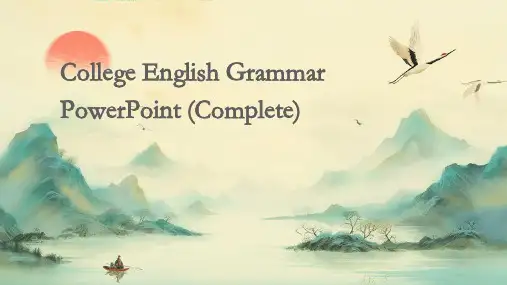
英语语法1.名词1.1名词复数的规则变化1.2其他名词复数的规则变化1.3名词复数的不规则变化1.4不可数名词量的表示1.5定语名词的复数1.6不同国家的人的单复数1.7名词的格2.冠词和数词2.1不定冠词的用法2.2定冠词的用法2.3零冠词的用法2.4冠词与形容词+名词结构2.5冠词位置2.6数词3.代词3.1人称代词的用法3.2人称代词之主、宾格的替换3.3代词的指代问题3.4并列人称代词的排列顺序3.5物主代词3.6双重所有格3.7反身代词3.8相互代词3.9指示代词3.10疑问代词3.11关系代词3.12every,no,all,both,neither,nor3.13none,few,some,any,one,ones3.14代词比较辩异one,that和it3.15one/another/the other3.16“the”的妙用3.17anyone/any one;no one/none;every/each 3.18both,either,neither,all,any,none 3.19many,much3.20few,little,a few,a little4.形容词和副词4.1形容词及其用法4.2以-ly结尾的形容词4.3用形容词表示类别和整体4.4多个形容词修饰名词的顺序4.5副词及其基本用法4.6兼有两种形式的副词4.7形容词与副词的比较级4.8as+形容词或副词原级+as 4.9比较级形容词或副词+than 4.10可修饰比较级的词4.11many,old和far4.12the+最高级+比较范围4.13和more有关的词组5.动词5.1系动词5.2什么是助动词5.3助动词be的用法5.4助动词have的用法5.5助动词do的用法5.6助动词shall和will的用法5.7助动词should和would的用法5.8短语动词5.9非谓语动词6.动名词6.1动名词作主语、宾语和表语6.2Worth的用法7动词不定式7.1不定式作宾语7.2不定式作补语7.3不定式主语7.4It's for sb.和It's of sb.7.5不定式作表语7.6不定式作定语7.7不定式作状语7.8用作介词的to7.9省to的动词不定式7.10动词不定式的否定式7.11不定式的特殊句型too…to…7.12不定式的特殊句型so as to 7.13不定式的特殊句型Why not 7.147不定式的时态和语态7.15动名词与不定式8.特殊词精讲8.1stop doing/to do8.2forget doing/to do8.3remember doing/to do8.4regret doing/to do8.5cease doing/to do8.6try doing/to do8.7go on doing/to do英语微信群是目前学习英语最有效的方法,群里都是说英语,没有半个中文,而且规则非常严格,是一个超级不错的英语学习环境,群里有好多英语超好的超牛逼的人,还有鬼佬和外国美眉。
大学英语语法第一章高频语法第一节时态和语态一,动词时态1:一般现在时:主语+动词原形(若主语是第三人称单数,动词原形一般加-s或-es)考点:在时间或条件状语从句中,用一般现在时代替一般将来时。
例句:I will tell her when she comes tomorrow.明天她来的时候我会告诉她的。
2:一般过去时:主语加动词的过去式。
3:一般将来时:主语+shall/will+动词原形主语+be going to+动词原形;主语+be+动词不定式,主语+be about+动词不定式;主语+be+现在分词(仅限位移动词)考点:祈使句+and/or+陈述句结构中,and/or后面的句子应用一般将来时。
而其前面的祈使句部分表示条件。
如果前后是顺承关系就用暗的,如果前后是转折关系则用or。
例句:Give me one more hour.And I will get the work finished。
再给我一个小时我就能完成这项工作。
4:现在进行时:主语+am/is/are+现在分词5:过去进行时:主语+was/were+现在分词6:将来进行时:主语+shall/will be+现在分词7:现在完成时:主语+have/has+过去分词考点:表示从过去某个时间开始,延续到现在,并仍然可能延续下去的动作。
现在完成时常与表示一段时间的状语连用(如so far,up to know, since ,for a long time, for the past few years 等)8:过去完成时:主语+had+过去分词(考点)9:将来完成时:主语+shall/will have+过去分词(考点)10:现在完成进行时:主语+have/has been+现在分词(考点)11:过去完成进行时:主语+had been+现在分词12:过去将来时:主语+should/would+动词原形二,被动语态1:被动语态的用法(1)当不知道或没有必要指出动作的执行者时。